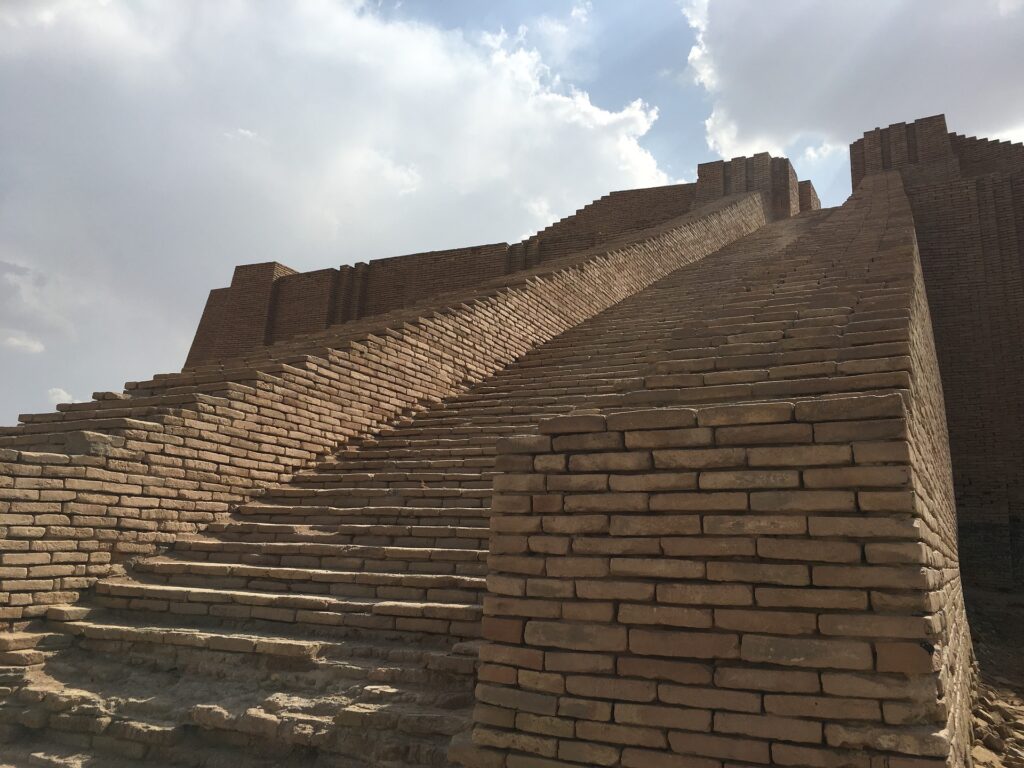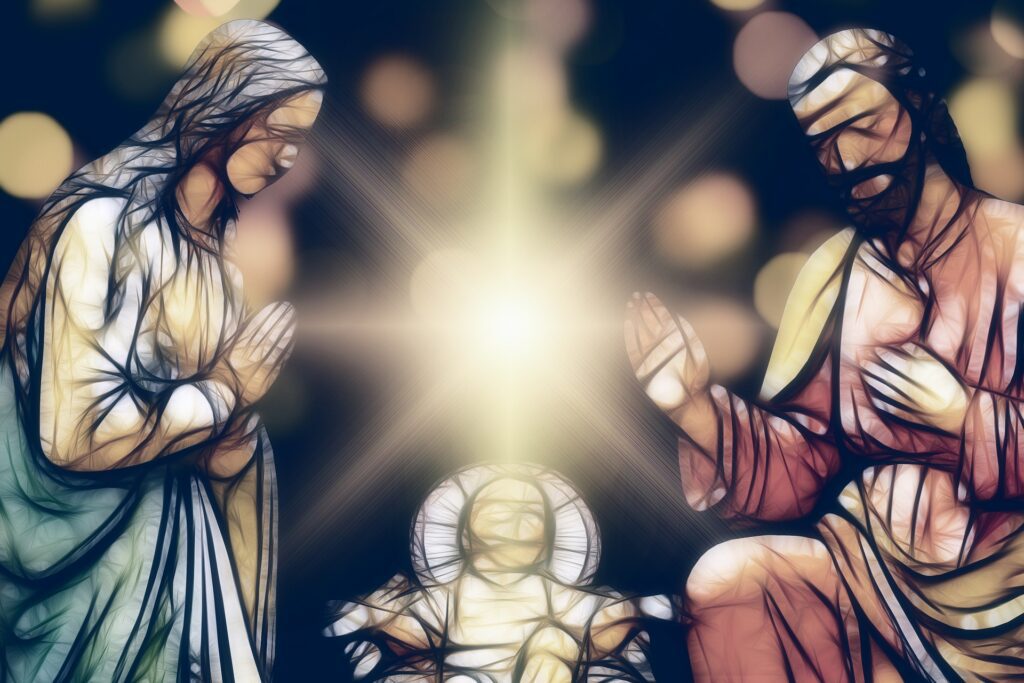This page may contain affiliate links, which means I may receive a commission from purchases made through links.
In another post, we discussed Jesus’ calling of his first five disciples in John 1:35-50, and we learned the identity of four of them: Andrew, Peter, Philip, and Nathanael, and one who is unnamed in the narrative. Nathanael, the last one called in this passage, experienced a sign that changed his life. Jesus told him that he saw him in a very private moment, which he would not have known outside of divine revelation. This was enough evidence of Jesus’ identity to him, so he called him Lord and King. Jesus pointed out to Nathanael that he needed the sign to believe, and he encouraged him that he would see many more signs like it. Jesus’ next words point to his role as the new temple in the new covenant.
The Celestial Staircase
In verse 51, we get one last statement from Jesus before closing the curtain on this scene. He says to Nathanael, “Truly, truly, I say to you, you will see heaven opened, and the angels of God ascending and descending on the Son of Man.” In English, this appears to be merely a continuation of his promise that this disciple would see “greater things.” At first glance, this led me to think this was a prophecy for Nathanael specifically. However, a closer reading of the Greek text reveals that he refers to “you” in the plural. In the South, we say, “y’all.” So Jesus says, “Truly, I say to y’all, y’all will see…”
Jesus is talking to the disciples as a group, and what he says to them would have had some interesting implications. Often throughout the gospels, Jesus and the authors of the narrative make allusions to Old Testament passages and contemporary literature. This is one of those times.
The only Old Testament passage that makes mention of angels ascending and descending is found in Genesis 28. On his way to look for a wife, Jacob, the grandson of Abraham, laid down to sleep. “And he dreamed, and behold, there was a ladder set up on the earth, and the top of it reached to heaven. And behold, the angels of God were ascending and descending on it!” (Genesis 28:12). So, whereas Jacob saw a ladder, the disciples are told that they will see the Son of Man (which refers to Jesus himself) functioning as that ladder.
This ladder was not truly a ladder in the way we understand the word today. It was not some rickety device made of long beams and tiny steps. The Hebrew word for ladder also means “flight of steps.” And we are told that “the Lord stood above it” (Genesis 28:13). In the Ancient Near East, a common architectural structure was the ziggurat. This was a somewhat mountain-shaped building, with many steps leading up to the top, where a community’s religious leaders would go to communicate with their gods. It was a very ancient kind of temple.
This was the idea behind the tower of Babel in Genesis 11. In verse 4, the unified people say, “Come, let us build ourselves a city and a tower with its top in the heavens, and let us make a name for ourselves, lest we be dispersed over the face of the whole earth.” The tower “with its top in the heavens” was meant to mimic real mountains, which the ancients understood to be the dwelling place of divine beings. As the story goes, God stopped their work, confused their languages, and dispersed them to various lands where he wanted them to go (Acts 17:26). We understand further that they were set under the authority of the “sons of God,” which ultimately resulted in the nations worshiping these beings as gods, and God chose the people of Israel from among those nations to become a people devoted only to him (Deuteronomy 32:8).
This is the backdrop for the “ladder” that Jacob sees in his dream. God shows him a sort of celestial temple, a structure intended for communication between earth and the spiritual world, with Yahweh being the object of worship, as opposed to the many other gods that were worshiped among the nations.
The New Temple
The connection to the choosing of the people of Israel is affirmed here, when God says to Jacob, “I am the Lord, the God of Abraham your father and the God of Isaac. The land on which you lie I will give to you and to your offspring. Your offspring shall be like the dust of the earth, and you shall spread abroad to the west and to the east and to the north and to the south, and in you and your offspring shall all the families of the earth be blessed. Behold, I am with you and will keep you wherever you go, and will bring you back to this land. For I will not leave you until I have done what I have promised you” (Genesis 28:13-15).
Jacob is given a promise here that the disciples would have remembered. Perhaps at the moment they heard these words, they didn’t fully understand what Jesus was communicating, but John’s inclusion of this promise helps us to see what is going on here. Just as Jacob (whose name would later be changed to Israel) is given a covenant as the father of the nation of Israel, so will these disciples (along with the rest of the apostles) be given a new covenant, mirroring the twelve tribes of Israel as the twelve “tribal heads” of the Church (Revelation 21:14), “the Israel of God” (Galatians 6:16).
Jesus putting himself in the place of the ziggurat staircase described in Genesis 28 is an indirect way of saying that he is the new ziggurat, the new temple. This fit with Jesus’ later assertion that his death and resurrection are the destruction and rebuilding of the temple (John 2:19).
Check out King of the Jews: Temple Theology in John’s Gospel by Margaret Barker!
The Means and the Message
Jesus tells his disciples they will see angels using the Son of Man as a staircase, ascending and descending between heaven and earth on him. While there is no biblical record of them having a vision like Jacob, they did come realize and experience this reality firsthand.
When the Bible uses the word “angel,” it is often applied to spiritual beings, but not always. The word simply means “messenger.” It is an office, a function served by any entity in the service of another to communicate a message. This is why Paul can refer to his “thorn in the flesh” as a “messenger of Satan” (2 Corinthians 12:7). It is why John the Forerunner is referred to as a messenger (the same Greek word) who would prepare the way of the Lord before Jesus began his ministry (Matthew 11:10).
There have been many interpretations of what Jesus means when he says the angels ascend and descend on him, but it is likely that it was not meant to literally describe spiritual beings using Jesus’ body to march up and down on. If it were, then there likely would have been a biblical record of this being fulfilled in the life of the present disciples, through a vision or a historical event.
There is a stronger reason, however, than just an argument from silence to support a symbolic approach to this, and it has to do with the purpose of the original vision. What Jacob saw physically in his dream represented a promise for a physical land that would become the possession of a physical people called Israel. But what the disciples were being set up for is more than this. Under the new covenant, the promise is fulfilled. The nations of the world are reclaimed under the banner of Christ Jesus. And this same Jesus is the bridge between heaven and earth, whereby the messengers of God are no longer confined to one temple in one city in one nation.
Now, the line of communication is forever open, and God’s message comes to mankind through Christ, just as mankind “comes to the Father” through Christ (John 14:6). “For through him we both,” Jew and Gentile alike, “have access in one Spirit to the Father” (Ephesians 2:18). So then, the fulfillment of this prophecy to the disciples is just that: Heaven and earth are connected by Jesus at every point, not just in the land of Israel. Jesus is both the means of contact and the message that is preached by the angels, whether they are human or divine.
Cross the Bridge
Knowing this, the question becomes this: Have you crossed that bridge? When I was growing up in the Church, I knew nothing of this connection. I knew Jesus died for my sins, but I didn’t know what that meant for me. I believed in God, but I didn’t know how he felt about me.
In my stoner days, I remember a moment sitting among my friends, “high as a kite,” we would say. When God began to shift my thinking toward him again, I looked at the ceiling and thought, “What does God think of me right now?” After all, I cared nothing for living right. I felt guilt for the way that I was living, which was appropriate, but my church experience convinced me that my life had become too dirty for God to love me, that I was too messed up, too impure. My initial answer to the question in my mind was that God was disgusted with me, but I came to learn over time, as he drew me close, that he desires to be near me. It is the entire reason his Son came, “to seek and to save the lost” (Luke 19:10). He came to become that bridge, that stairway to heaven, that temple of the Father. And nothing I do will undo what he accomplished.
Today, if you are reading this, most likely you care what God thinks. That is the whole point of this blog. But you may not yet have come to a point where you truly believe he thinks about you. But because of Jesus, you and I are now inheritors of the promise given to our father Abraham, and the Spirit speaks to us in James 4:8, “Draw near to God, and he will draw near to you.” And as Psalm 95:7-8 says, “Today, if you hear his voice, do not harden your hearts.” Turn to him in this and every moment, and trust that his love is not just for others. His love is for you.
*If you enjoyed this post, please comment your thoughts down below and consider subscribing to receive updates on new blog posts.




I have struggled with self-loathing for most of my life. Time and time again, my thoughts have been reinforced by many people and circumstances, and sometimes, even in a church setting! I often feel completely unworthy, and even invisible, as if I have no value at all.
I know people say God loves us as we are, but I have never really taken that to heart and grasped the concept. But when you wrote about the time you were high as a kite and you wondered what God thought of you then, it struck a chord with me.
Thank you for this. It is what I needed tonight. I know I need to adjust my way of thinking and become the person He says I am.